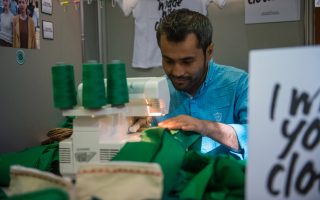The protracted crisis and descent of Golden Dawn

Greece's Golden Dawn sustained significant losses in the two recent election races in Greece. In its former stronghold of Laconia in the Peloponnese, the neo-Nazi party lost more than 50 percent of the support it had in the 2014 European Parliament elections in last month’s contest.
Even though party leader Nikos Michaloliakos and other high-ranking cadres hail from the region’s Mani district, some 4,300 former voters there turned their backs on the party. Behind the numbers, however, are tales of infighting, desertions and open challenges to the party’s leadership.
As the trial against Golden Dawn – accused of constituting a criminal organization and orchestrating the 2013 murder of rapper Pavlos Fyssas – enters the final stretch, former party officials who spoke to Kathimerini criticize the leadership, citing nepotism and insularity.
“It turns out that the leadership wants soldiers. Soldiers who do nothing else. It doesn’t like being argued with,” a former Golden Dawn candidate for local government, who requested anonymity, told Kathimerini.
From being the third most popular party in Greece with 9.39 percent (500,000 votes) in the European elections of 2014, Golden Dawn dropped to fifth place with less than 5 percent (around 275,000 votes) last month. Michaloliakos’ decision to make Yiannis Lagos his chief candidate and to sideline the party’s previous MEPs appears to have been instrumental in spawning discontent in the party ranks.
Things were very different in April 2014 when Golden Dawn announced the candidacy of Eleftherios Synadinos in that year’s European elections, hailing the former Greek army lieutenant general as an “eminent figure in our nation’s public life.”
Four years later, and after Synadinos left the party – accusing it of being run by a “close circle of idlers” – Golden Dawn leadership did a 180-degree turn. The party, it said in a public announcement, “existed before 2014 when the Euro MP in question appeared out of nowhere.”
“Michaloliakos believes that Golden Dawn needs to operate like a private club, with a hard core, and a family dynasty,” Synadinos told Kathimerini, citing the examples of Eleni Zaroulia, Michaloliakos’ wife, and their daughter Ourania, both of whom have influential roles in the party.
“He clashed with a lot of party officials over this. They criticized Ourania’s behavior and the fact that she treated others as though she was their boss,” he added.
While Michaloliakos was in pretrial custody in 2014, Ilias Kasidiaris, the party’s spokesman and a failed candidate for Athens mayor in the recent local elections, was responsible for drawing up the party’s list of MEP candidates, choosing people outside the hard core who would resonate with far-right voters.
Apart from Synadinos, he also selected Giorgos Epitidios, another former high-ranking military officer, and Lambros Fountoulis, the father of one of two Golden Dawn members who were gunned down in November 2013 outside the party’s offices in the northern Athens suburb of Neo Iraklio.
However, Epitidios and Fountoulis were struck from the list shortly before the party announced its candidates ahead of the recent elections.
“The party decided to bring back old cadres. I had been on the front line and did not expect such treatment,” said Epitidios. Asked whether he may have been a victim of a leadership struggle between Michaloliakos and Kasidiaris, Epitidios said that he was never present at the party’s meetings, but did not rule out the possibility. He also claimed to have asked for a meeting with the party leader after he was dismissed as a candidate, only to be refused.
Sources say that Lagos was nominated as a candidate at his own request. Alphabetically, his name came second on the list, behind Athanasios Constantinou, one of Golden Dawn’s founding members and also ex-military. Both were elected.
According to the prosecution in the ongoing trial against Golden Dawn, Lagos – the party’s leader for the broader area of Piraeus, including Perama, where he is from, and the MP for Piraeus’ second constituency elected in 2012 – was a key player in all the cases that are being examined (the murder of Fyssas, as well as two deadly attacks on a group of PAME unionists and on a group of Egyptian fishermen) and which took place under his watch. He is also seen as having acted as a liaison between lower-ranking party members and the leadership.
One interpretation is that making him an MEP was a strategy to bolster the defense narrative that Golden Dawn’s local chapters had acted independently of the party’s hierarchy during the events in question. The defendants’ testimony, which is expected later this month, promises to be enlightening.
Meanwhile, the recent presence of Nikos Roussopoulos, one of Lagos’ two defense lawyers who is from the regional unit of Messinia in the Peloponnese, at several campaign rallies in southern Greece, is seen as further evidence of a concerted effort by Michaloliakos to bolster his close associate.
These and other decisions by the party’s leadership have caused rifts. On April 6, for example, Dimitris Adamopoulos announced that he would no longer represent the party in Messinia, accusing the leadership in a public announcement of “dishonesty” and “doing the exact opposite of what it claims.”
Likewise, in Laconia, Giorgos Dimakoyiannis, who published a local party newsletter and got the largest number of votes in the region in the January 2015 elections, has also left the party.
Losing Attica, northern Greece
The internal crisis, however, does not appear to be limited to Golden Dawn’s chapters in the Peloponnese. Just last week, four of the five members who sit on the party’s board in Pieria, northern Greece, resigned.
Despite the public controversy over the North Macedonia name deal and their fervent nationalist rhetoric, Golden Dawn’s representatives in northern Greece not only failed to hang onto previous votes, but lost almost half their support. In Kilkis and Imathia, the party dropped from 13 and 12.4 percent respectively in 2014 to 7.2 and 6.4 percent in this May’s European elections.
The party itself attributes these losses to the emerging popularity of Greek Solution, the pro-Christian populist far-right party of Kyriakos Velopoulos. According to Petros Ioannidis, an election analyst at About People, however, this argument is not backed by the numbers, which show that only 12 percent of voters who supported Golden Dawn in 2015 moved to Greek Solution, with another 12.6 percent moving to New Democracy, the main conservative opposition.
“Ilias Panagiotaros and Ilias Kasidiaris did not have to compete against a Greek Solution candidate for [the Region of] Attica and [the Municipality of] Athens, yet both saw support shrink by around 50 percent,” added Ioannidis. In 2014, Panagiotaros had garnered 180,908 votes in the regional elections; this time he only got 89,141. Kasidiaris’ popularity also declined, from 16.1 to 10.5 percent.
The specter of the trial
A couple of weeks after the September 2015 general elections, Michaloliakos appeared on an Extra TV news program where Velopoulos was the presenter, and flatly denied rumors of a crisis in his neo-Nazi party.
“Golden Dawn is the only party that doesn’t suffer from internal problems,” he claimed. Just days later, however, Michaloliakos wrote a commentary that referred to “a fifth phalanx of whisperers who have the nerve to claim that the 7 percent of the vote we got in the last elections was a defeat.”
Such tension became increasingly apparent in the months that followed as a number of cadres left the party. In March 2018, former Argolida MP Giorgos Galeos switched allegiances to Popular Orthodox Rally (LAOS), announcing that his decision was the direct result of “Golden Dawn’s political choices and the public image it transmits.”
Three months later, the party’s MP in Larissa, central Greece, Despina Sveroni, also left to join the then new Radical Patriotic Union party, founded by former Golden Dawn MEP Eleftherios Synadinos. Galeos and Sveroni had been elected as MPs in January 2015 but failed to get re-elected in September of that same year.
In 2017, meanwhile, erstwhile stalwarts Dimitris Koukoutsis and Nikos Michos, both suspects in the Golden Dawn trial, left the party ranks to become independent MPs. Koukoutsis accused the party of opening its ranks to “old-school party hacks, remnants of a bygone establishment, who in alliance with certain motley illiterate know-it-alls, prevented the movement from becoming stronger.” He joined Synadinos’ party in June 2018.
In the meantime, even though Koukoutsis left GD, he continued to employ the same lawyer as his fellow defendants in the trial, unlike Michos, who wanted to make his break with the party more apparent and took a different line of defense by hiring a lawyer outside the party ranks.





